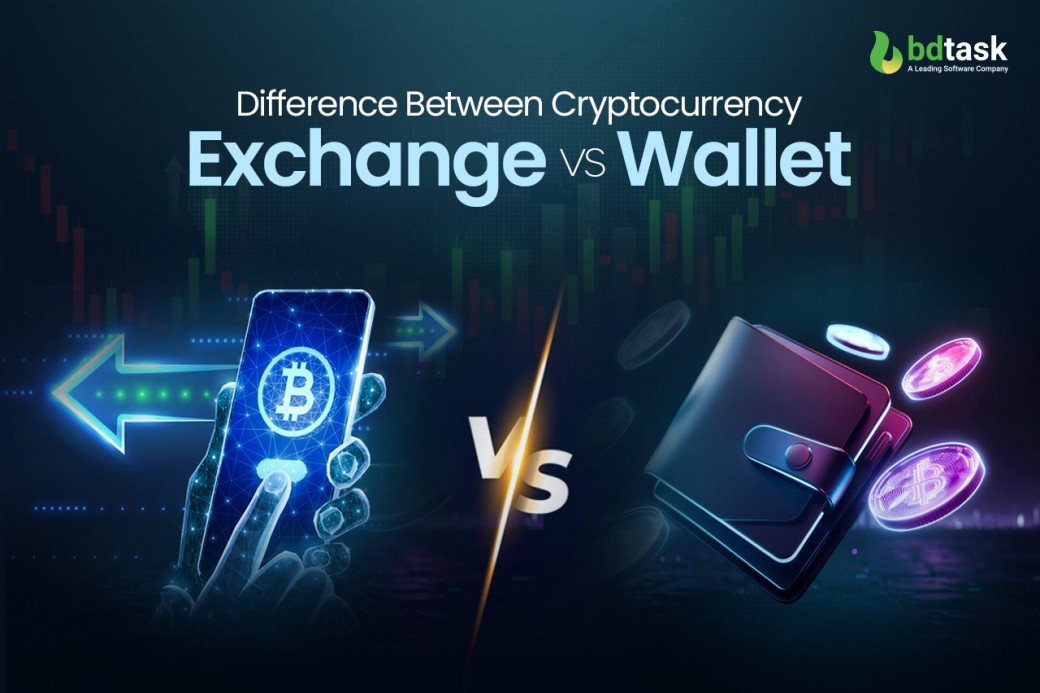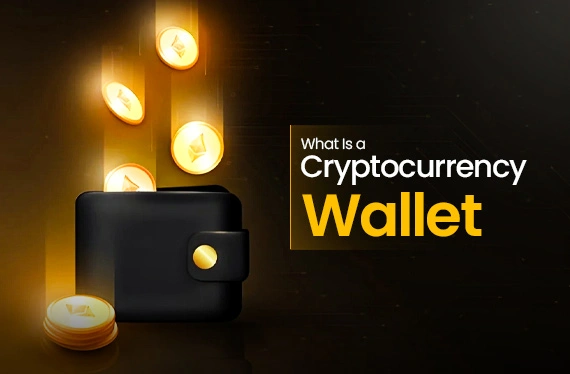Is A Cryptocurrency Exchange Different From A Cryptocurrency Wallet

The cryptocurrency market has gained massive popularity. Many businesses are adopting them for various transactions and investments. People are looking for ways to sell, buy, store, and manage their digital assets more securely. Talking about security, they are now confused about which one to invest in. There is a debate on Cryptocurrency exchange vs wallet. Which one is more capable and most beneficial to invest in?
Indeed, all of these cryptocurrency tools are good investments, but they also have advantages and disadvantages. Before making any investment, it's really important to focus on the requirements and then choose the best one. But no worries. We are here to help.
In this blog, we will give a total discussion about the cryptocurrency exchange vs wallet and which one is perfect for you. Till then
Let's read it.
What Is a Cryptocurrency Exchange

Basically, it's an advanced online platform tool. It allows users to buy, sell, exchange, and trade cryptocurrencies. It works similarly to the stock exchange. But this transaction is worked by the digital assets. The digital assets, like Bitcoin, Ethereum & and Tether.
On the other hand, it is a digital currency exchanger (DCE). Cryptocurrency exchange is the backbone of the digital currency world. It is simple: Create an account, and you are ready to go. Users can transfer funds and start trading different cryptocurrencies.
All those exchanges can be done with a credit card or a different form of payment in exchange for digital assets or cryptocurrencies. Although cryptocurrency exchange can be defined in three main ways, it includes
Centralized Exchanges
Initially, cryptocurrency transactions were difficult to make, but then the market introduced this centralised exchange method. Basically, it operates centralised companies and acts as an intermediary between buyers and sellers. Some of the elements that make cryptocurrency centralised are
- Ownership by a single entity or a group
- Operate by this group or entity
- Provide security measures for crypto users
- Operate user accounts and capital
- Settle disputes between parties
- Allow fiat currency and cryptocurrency exchanges
- Match buy and sell orders between customers
- Collect information about users
- Give funds for escrow services to protect users
If we talk about the pros of this exchange type, it has great liquidity and is easy to recover. But if we talk about the disadvantages of crypto exchanges, then it's easy to hack a CEX store.
Popular cryptocurrency exchanges are Binance, Coinbase Exchange, Kraken, and KuCoin.
Decentralized Exchanges
If we're talking about the decentralised exchange, then it's the total opposite of the centralised exchange. DEXs are handled without the central authority. That means you can easily trade cryptocurrencies without any authority concern. One of the most important things to note about the decentralised exchange is that it allows crypto-to-crypto exchanges. These exchanges will enable you to easily exchange transactions through a digital wallet without going through an intermediary. It mainly relies on smart contracts. It's more secure and easier to use than the centralised exchange system. However, this exchange system user has complete control of their keys and digital assets. However, every exchange system has its advantages and disadvantages.
The pros of this system are that it is more secure and functional than the above system. This ensures that this system is safe and reduces the risk of a cyber attack. The disadvantage of this system is that it has low liquidity.
Some examples of DEXs include Uniswap, PancakeSwap, dYdX, and Kyber.
Hybrid Exchange
It's a mixture of both CEX and DEX. Although it is a mixture of both systems, it provides more liquidity and customer support than either. Key features of this exchange include
- On-Chain and Off-Chain Transactions
- Dual Wallet Integration
- High Liquidity and Market Making
- Smart Contracts for Secure Transactions
- KYC and AML Compliance
Using the hybrid exchange method has some advantages as well. It provides more security control and user experience than other crypto exchange types. Regarding speed, it allows for more high-frequency trading activities off-chain than the centralised exchange platform. The transaction is the most important part of any exchange model. This method delivers a transparent and trustless user experience. It also maintains institutional standards than traditional DEXs.
Let's discuss the disadvantages of this model. Developing this system is more complex than usual. Skilled blockchain developers need to build these tools, which would be more costly than normal. Although this model offers hybrid security, there is a risk of hacks if funds are stored on the exchange.
Now, if you ask me which one is the most trusted, I would say it depends on your needs. Binance, Kraken, Coinbase, Robinhood, and Gemini are the most used by millions of people.
What Is Crypto Exchange Wallet

If we say something simple about this, something like it's an application that works as a crypto wallet for your cryptocurrencies. Why is it called a wallet? Because it works like a wallet. It stores a passkey for you. If you make any transaction, you need this passkey to send or receive cryptocurrency like Bitcoin and Ethereum. Crypto technically doesn't store your crypto. Wallets contain a private key and address. If you share it with anyone, this person can access your cryptocurrencies. It's pretty simple to use. Suppose you want to make transactions, then first of give the recipients' wallet addresses and choose the amounts. After that, sign the transaction using the private keys and then add the amount and fee, and you're good to go.
Apart from that, a wallet is a combination of a public address and private keys. So there are two types of wallets we can say, which are cold wallets and hot wallets. Let's explore these two wallets.
Hot Wallet
Hot wallets a software that store your private keys, but they're connected to the internet. That means you can connect this wallet with different devices like cellular phones, tablets, and laptops. A broad number of people use it because they can easily access it from anywhere. Some of the common hot wallets are
- Coinbase Wallet
- MetaMask
- Trust Wallet
- Exodus Wallet
Hot wallet provides fast and convenient access to crypto. It's ideal for providing frequent trading experience. It's usually free to use some examples of hot wallets, such as BitGo, Trustbase Wallet and Coinbase Wallet.
Cold Wallet
Conversely, a cold wallet is the opposite of a hot wallet. You can store your private keys offline. Businesses, governments, and individuals used this data security technique for a decade, to use it later. It's more secure than a hot wallet. This method is more useful for individual investors and users. Types of cold wallets
- Hardware wallets
- Air-gapped devices
- Paper "wallets"
Every model has some advantages and disadvantages. Some of those are
Pros
• Full control of your assets and private keys
• Higher security, especially with cold wallets
• Suitable for long-term holding
Cons
• Requires technical knowledge
• Funds are harder to recover if keys are lost
• Less convenient for regular trading
So now, which wallets are suitable? Both are good to use, but you can use two simultaneously if you want, like storing most assets in a cold wallet for long-term security and keeping a smaller amount in a hot wallet. However, you must usually maintain security needs, usage frequency, and investment strategy.
So, after talking about cryptocurrency exchange and wallet, what do you think? Cryptocurrency Exchange Vs Wallet: Which one won the fight? Let's check some facts before deciding on any of those for your crypto business.
Cryptocurrency Exchange Vs Wallet - Top Differences
The global cryptocurrency market is projected to generate US$45.3 billion in revenue by 2025. It's essential to understand the difference between cryptocurrency exchange vs wallet. In the market, there are some questions included
- What is different in exchange vs wallet
- Which one to choose, wallet vs exchange
- How is a cryptocurrency exchange different from a cryptocurrency wallet
- How is the difference between a cryptocurrency exchange vs wallet
We need to clarify all these things because when you invest in this market, it's important to know all the components and how they work. Which one is easy to use, and when should you use it? Let's discuss it one by one.
Functionality
The main difference between cryptocurrency exchange Vs wallet is in their features. If you focus on just storing and managing your cryptocurrencies, then a wallet is suitable for you. A cryptocurrency wallet kindly allows users to send and receive cryptocurrencies and often includes features like
- Tracking transaction history
- Managing multiple currencies
It also ensures interacting with decentralised applications (DApps) in the case of Web3 or DeFi wallets.
If you want to focus on your crypto business (Buying, selling, trading), then a cryptocurrency exchange is the option. The core functionality of exchanges is focused on
- Market transactions
- Offering trading pairs (like BTC/ETH, ETH/USDT),
- Order books
- Price charts
- Tools for technical analysis
In summary, wallets are for holding and managing, while exchanges are for buying and selling.
Security
Another difference between a wallet and an exchange is the security of these platforms.
A cryptocurrency wallet, especially a non-custodial one, is more secure than a crypto exchange. Non-custodial wallets give complete control over the private keys. This also means that the funds are irretrievable if the private key or recovery phrase is somehow lost or stolen. Hardware wallets are the most secure type, storing keys offline and making them immune to most online threats.
Cryptocurrency exchanges are custodial by default, meaning the exchange controls the private keys and manages the assets on the user’s behalf. Centralised exchanges are the prime target for hackers. In modern technology, tools are constantly being upgraded. While modern exchanges implement strong security protocols such as :
- Two-factor authentication (2FA),
- Cold storage
- Insurance funds
At a glance
Wallets place security responsibility on the user, exchanges offer convenience at the cost of trust and third-party risk.
Worldwide Usability
Usability is one of the main concerns about cryptocurrency exchange vs wallet.
A cryptocurrency wallet is more advanced if we are talking about the usability of a centralised wallet. You can control these tools from anywhere. As decentralised tools, they can function anywhere in the world as long as there’s internet access. Wallets are not typically subject to geographic restrictions, know-your-customer (KYC) checks, or regulatory blocks. It makes them ideal for use in regions with restrictive financial systems or limited access to traditional banking.
On the other hand, users can encounter some barriers to using a cryptocurrency exchange. They may need to undergo identity verification, and certain countries may be blocked from accessing specific platforms altogether due to regulatory issues. Sometimes, some countries ban Binance or Coinbase because of local laws or sanctions.
At a glance
Wallets offer broader global usability, while exchanges may be restricted based on jurisdiction and legal regulations.
Control Management
Control management is an important thing that differentiates these two. We always wanted complete control over our money. Crypto wallets give you these advantages. When that is non-custodial. Using a crypto wallet does not require authorisation from any third parties. It will provide you with real decentralisation and personal sovereignty.
But when you use an exchange, especially the centralised one, you give control over the private keys. You can face different issues, including
- Accounts can be frozen
- Transactions can be delayed
- Funds can be lost if the exchange collapses
At a glance
For users prioritising autonomy and long-term security, wallets are the comfortable choice. On the other hand, if you prioritise liquidity and fast trades in cryptocurrency, exchanges serve as a better tool.
Final Talk
For better crypto management, you need to it is essential to comprehend the difference between cryptocurrency exchange vs wallet. Both crypto wallets and exchanges are needed for crypto users. Exchange enables you to buy, sell, and trade, and a wallet offers a safer spot for managing this asset. Wallets are best for secure storage, personal control, and long-term holding. Exchanges are ideal for trading, liquidity, and entry into the crypto market.
Using these advanced exchanges and a wallet that meets your specific needs and gives maximum ROI in your cryptocurrency business market.










